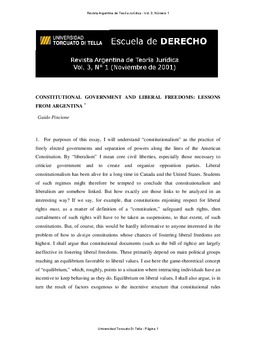| dc.rights.license | https://rightsstatements.org/page/InC/1.0/?language=es | es_AR |
| dc.contributor.author | Pincione, Guido | es_AR |
| dc.date.accessioned | 2018-06-20T17:57:28Z | |
| dc.date.available | 2018-06-20T17:57:28Z | |
| dc.date.issued | 2001-11 | |
| dc.identifier.uri | https://repositorio.utdt.edu/handle/20.500.13098/11003 | |
| dc.description.abstract | I shall argue that constitutional documents (such as the bill of rights) are largely ineffective in fostering liberal freedoms. These primarily depend on main political groups reaching an equilibrium favorable to liberal values. I use here the game-theoretical concept of “equilibrium,” which, roughly, points to a situation where interacting individuals have an incentive to keep behaving as they do. Equilibrium on liberal values, I shall also argue, is in turn the result of factors exogenous to the incentive structure that constitutional rules impose on political actors. The procedural rules of a constitution, rather than its bill of rights, play a central role in promoting liberal freedoms once some such equilibrium is already in place. Or so I shall try to show. Some episodes in Argentine constitutional history will serve to illustrate these theses. | es_AR |
| dc.format.extent | 10 p. | es_AR |
| dc.format.medium | application/pdf | es_AR |
| dc.language | eng | es_AR |
| dc.publisher | Universidad Torcuato Di Tella. Escuela de Derecho | es_AR |
| dc.relation.ispartof | Revista Argentina de Teoría Jurídica. Vol. 3, n. 1, (nov. 2001). ISSN: 1851-684X | es_AR |
| dc.rights | info:eu-repo/semantics/restrictedAccess | es_AR |
| dc.subject | Argentina. Constitución de la Nación | es_AR |
| dc.subject | Liberalismo | es_AR |
| dc.subject | Democracia | es_AR |
| dc.title | Constitutional government and liberal freedoms : lessons from Argentina | es_AR |
| dc.type | info:eu-repo/semantics/article | es_AR |
| dc.type.version | info:eu-repo/semantics/publishedVersion | es_AR |

